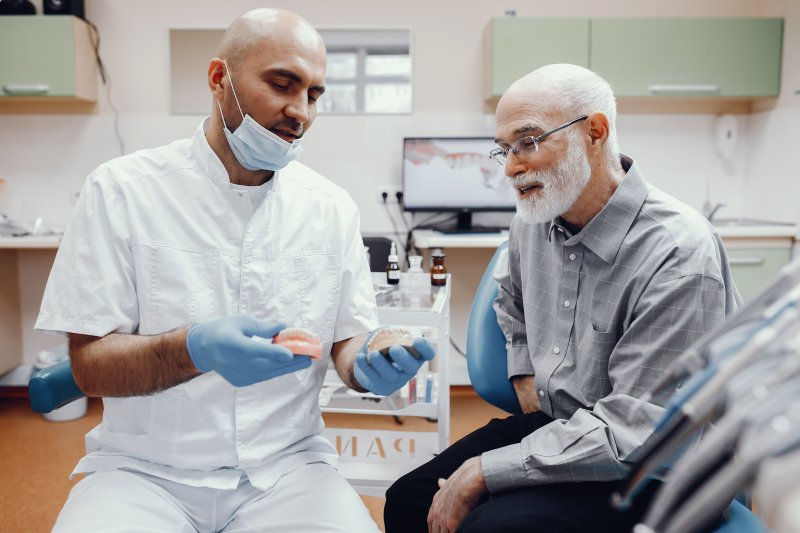
How many times have you put your dentures in only to have one of them wobble? Many denture wearers experience this issue, and it can be frustrating, uncomfortable, and even embarrassing. Fortunately, there are a few common reasons why your prosthetic might be loose—and ways you can troubleshoot the issue. Continue reading to explore what could be causing your denture to slip and what you can do about it.
Poor Denture Fit
Dentures naturally wear down over time, becoming less rigid or able to apply suction effectively. Because of this, their fit can become less secure. If your dentures are several years old or weren’t fitted correctly in the first place, they’re far more likely to move around.
The Solution: If your dentures are loose due to wear or poor fit, your dentist may recommend relining or replacing them. A reline is a temporary measure that involves adding material to the denture base to improve the fit. This can often solve the problem, but if your prosthetic is too old, it may simply need to be replaced.
Bone Loss in Your Jaw
One of the main reasons dentures don’t stay in place, especially lower ones, is jawbone loss. When you lose a tooth, the jawbone underneath starts to slowly deteriorate. If you have multiple teeth or a full arch missing this can cause your jawbone to shrink, changing its shape. This shrinkage can cause your denture to become loose over time, as it no longer has a stable base to rest on.
The Solution: If bone loss is the issue, a bone graft or dental implants can provide more stability. Implant dentures attach directly to implants placed in your jawbone, offering stimulation for the bone and preventing further losses.
Lack of Muscle Control
Wearing dentures properly is a skill that must be developed over time. If you’re new to them, you may not have the muscle control necessary to keep them from slipping out of place just yet.
The Solution: Practice, practice, practice! Reading aloud or talking with friends or family are both great ways to slowly train your jaw muscles, lips, tongue, and cheeks to adapt. Slowly, but surely, you should start to notice a difference. In fact, most patients usually adjust within a few weeks of consistent use.
A loose denture doesn’t have to be a permanent problem. Whether it’s due to bone loss, poor fit, or diet, your dentist can help you find the right solution. There are several options available to help your prosthetics stay securely in place, so give your dentist a call and don’t give up!
About the Author
Dr. Aliana Henkin is a bright and talented dentist with a passion for helping patients achieve their dream smiles. After earning her dental doctorate from the Rutgers School of Dental Medicine, she jumped into advanced training. Today, she’s a proud member of multiple professional organizations like the New Jersey Dental Association where she continues to expand her skills. Call (973) 949-0925 to schedule a denture consultation at Skyline Dental or visit our website to discover other treatments and services we provide.
